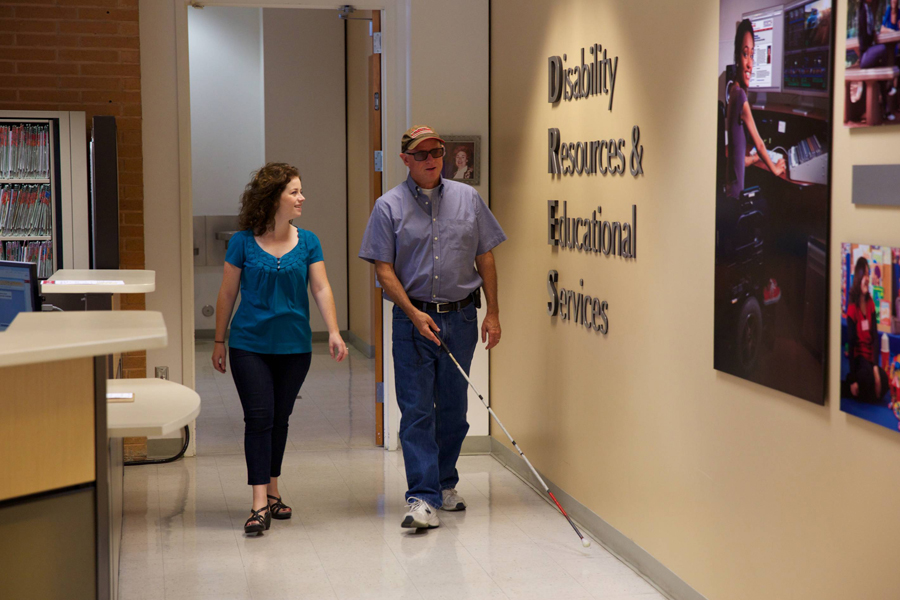CSUN Celebration to Honor Students with Disabilities, Faculty and Staff Who Make a Difference
They are basic services, but essential to student success: help with note taking, accommodations during test time, converting a textbook or coursework into braille or helping a professor adapt his or her curriculum to take into account the needs of a student with disabilities.
For more than 40 years, California State University Northridge’s Disability Resources and Educational Services (DRES) has helped students with disabilities gain the tools necessary to ensure that they are on the path to graduation and a career. That decades-long effort has earned CSUN a reputation for being one of the most inclusive institutions of higher education in the country.
“When entities like U.S. News and World Report rank universities, they look at things like graduation rates, housing and athletics,” said Jodi Johnson, director of DRES. “They don’t look at things like the programs universities have for serving students with disabilities. While some campus disability programs focus only on access, we believe our job is to ensure that students with disabilities, who qualify to attend CSUN, should have the accommodations and support services they need to succeed in the classroom and graduate. That’s what we’re here for as an institution. Every student who comes through our doors deserves that opportunity.”
On Sunday, April 27, DRES will celebrate its 30th Annual Recognition Awards for Students with Disabilities in the Grand Salon of the University Student Union. On that day, DRES recognizes student achievement by giving scholarships to outstanding students who have excelled in some aspect of their life and celebrates CSUN faculty and staff members who have contributed to the access of the campus and the success of students with disabilities.
Senior Cameron Geller, who will graduate from CSUN next month with a bachelor’s degree in pre-med biology, credited the staff at DRES with his academic success. Geller, 25, of Burbank, has attention deficit disorder. He said he was too busy and “prideful” during his first couple of years at the university to ask for help.
“About two years ago, my grades were faltering, and I decided to swallow my pride and ask for help,” he said. “I made an appointment and met with people at DRES, and they created an environment where I felt welcomed. I could ask questions and not feel embarrassed to ask for what I needed, which included more time and a more private environment when taking tests. It made a difference. After getting the assistance I needed, I started averaging more than 100 percent on my exams.”
Geller plans to apply to medical school next year. In the meantime, he will study for the Medical College Admission Test. He is among the students who will be recognized at the celebration
The first CSUN department for students with disabilities was established in the mid-1960s for students who were deaf and hard of hearing. At that time CSUN was known as San Fernando Valley State College. In 1973, when Congress passed the Rehabilitation Act, the university expanded its services and created the Office of Handicapped Student Affairs, to include veterans of the Vietnam War who were returning from combat with disabilities and wanted the opportunity to attend college. This office later became known as Disability Resources and Educational Services. Today, DRES serves students who have learning, mental health, visual, mobility and communication disabilities.
“We, as a university, are not changing our standards or expectations for these students,” Johnson said. “To help them be successful we make sure they have the accommodations they need to be fully integrated in the campus so that they can succeed at the same level as any other student.”
In addition to exam accommodations, the DRES staff also provide note-taking assistance and help learning to navigate the university, textbook or coursework conversion to braille, career preparation and help accessing other resources, depending on a student’s needs. The center offers training and other resources to faculty who have students with disabilities in their classrooms. It also provides assistance to potential employers so they feel confident hiring a person with disabilities.
Johnson estimated that about 9 percent of CSUN’s more than 38,000 students have a disability, and about 1,500 of them have registered with DRES for assistance.
“The rest have determined that they don’t need our services,” says Johnson. “If we do our jobs right at DRES, then some day we won’t have jobs because the campus will have developed a culture where inclusion is so automatic that faculty and staff will instinctively know how to meet the needs of students with disabilities. We’re not there yet, but we’re getting there.”
For more information about Disability Resources and Educational Services or its April 27th celebration, call (818) 677-2684 or email dres@csun.edu.


 experience
experience